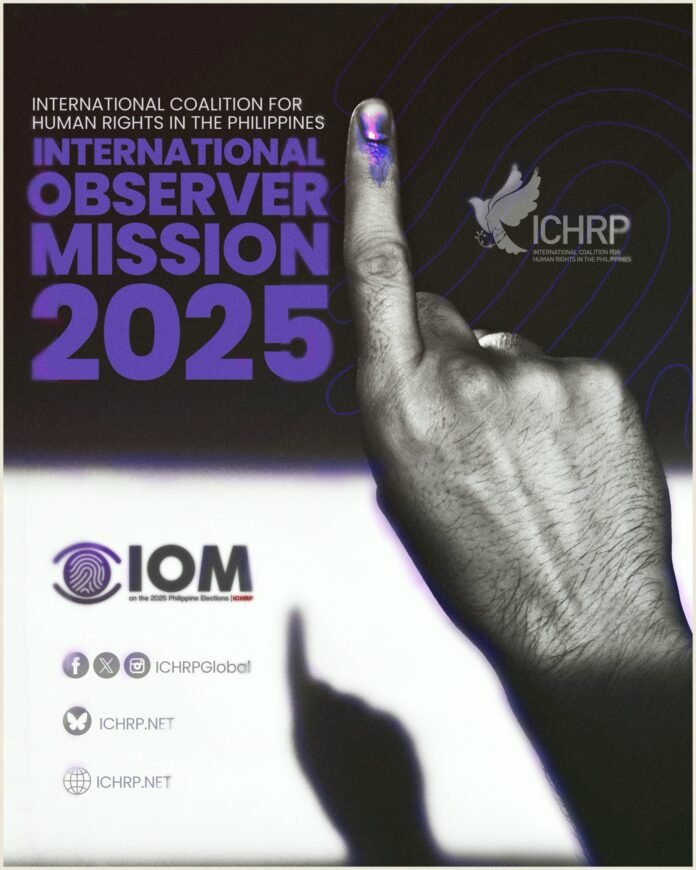The International Coalition for Human Rights in the Philippines (ICHRP) will be monitoring this year’s elections in the Philippines! Here are some quick facts about our International Observer Mission 2025 (IOM).
You can also find out more at https://ichrp.net/IOMFactSheet.
What is the IOM?
The International Observer Mission (IOM) is a people-led, independent election observation initiative rooted in international solidarity. It is organized by the International Coalition for Human Rights in the Philippines (ICHRP), a global network composed of faith-based groups, trade unions, lawyers, parliamentarians, academics, and human rights defenders across the globe.
The mission responds to the call for impartial, international scrutiny of the Philippine electoral process, amid persistent reports of state-sponsored violence, fraud, and foreign military interference. The IOM centers on disenfranchised Filipino communities, particularly in rural and militarized areas.
History and Context
Last 2021, Commissioners of the Independent International Investigation into Human Rights Violations in the Philippines (INVESTIGATE PH) in their 2nd and 3rd reports recommended that an independent international election observer mission be conducted to maintain the integrity of the May 2022 presidential elections. ICHRP responded by launching the IOM in 2022.
The IOM concluded that the 2022 Philippine elections failed to meet the international standard of a free, honest, and fair election.
The elections were marred by a failure of the electronic voting system, along with a high level of blatant vote-buying, widespread cases of red-tagging and documented cases of deadly violence. The report highlighted incidents of election-related violence, intimidation, harassment, and manipulation during the electoral process, which compromised the integrity of the elections and impeded citizens’ ability to participate freely.
Why Observe the 2025 Philippine Elections?
The 2025 elections unfold against a backdrop of:
- Escalating political rivalries between powerful dynastic blocs
- Rising electoral violence and militarization
- Widespread human rights violations, particularly in rural areas
What the IOM Will Monitor
- Election-related violence, intimidation, fraud, red-tagging, and vote-buying
- Disinformation and manipulation in both mainstream and digital platforms
- Violations of International Humanitarian Law (IHL), especially in communities affected by armed conflict and militarization
- Violations of Human Rights (HR), especially against rural and indigenous peoples
Meet the Commissioners
- Lee Rhiannon (Australia) – former Australian Senator
- Rev. Michael Blair (Canada) – General Secretary, United Church of Canada
- Sylvain Goldstein (France) – Asia Pacific Director, General Confederation of Labour in France (CGT)
- Colleen Moore (USA) – Director of Peace With Justice at the General Board of Church and Society
- Xavier Cutillas (Catalonia) – President, Catalan Association for Peace (ACP)
Methodology
The 2025 IOM will run from late April to mid-May, covering the May 12 election day, and has started to collect data and reports during the campaign period.
- International delegates from different countries will be deployed across Luzon, Visayas, and Mindanao, focusing on areas with documented histories of electoral violence
- IOM team will conduct field interviews with voters, poll watchers, campaigners, local officials, civil society and people’s organizations, candidates, campaigners, government authorities, politicians, media, and churches.
- Delegates will document and triangulate data on HR and IHL violations, in coordination with local watchdogs like Kontra Daya and Vote Report PH.
- Remote observation teams will monitor Overseas Absentee Voting (OAV), digital disinformation, and voting irregularities abroad.
All findings will be:
- Validated and consolidated by a central research team
- Cross-referenced with media reports and independent sources
The research team is composed of volunteer researchers and Commissioners with long-standing records in monitoring elections, democratic governance, humanitarian work, and peace-building.
Final Report and Public Release
Preliminary findings will be released shortly after election day. A comprehensive final report, containing analysis and recommendations, will be released publicly and presented to:
- International human rights institutions
- Relevant United Nations bodies
- Foreign embassies and parliaments
- Civil society and media partners




